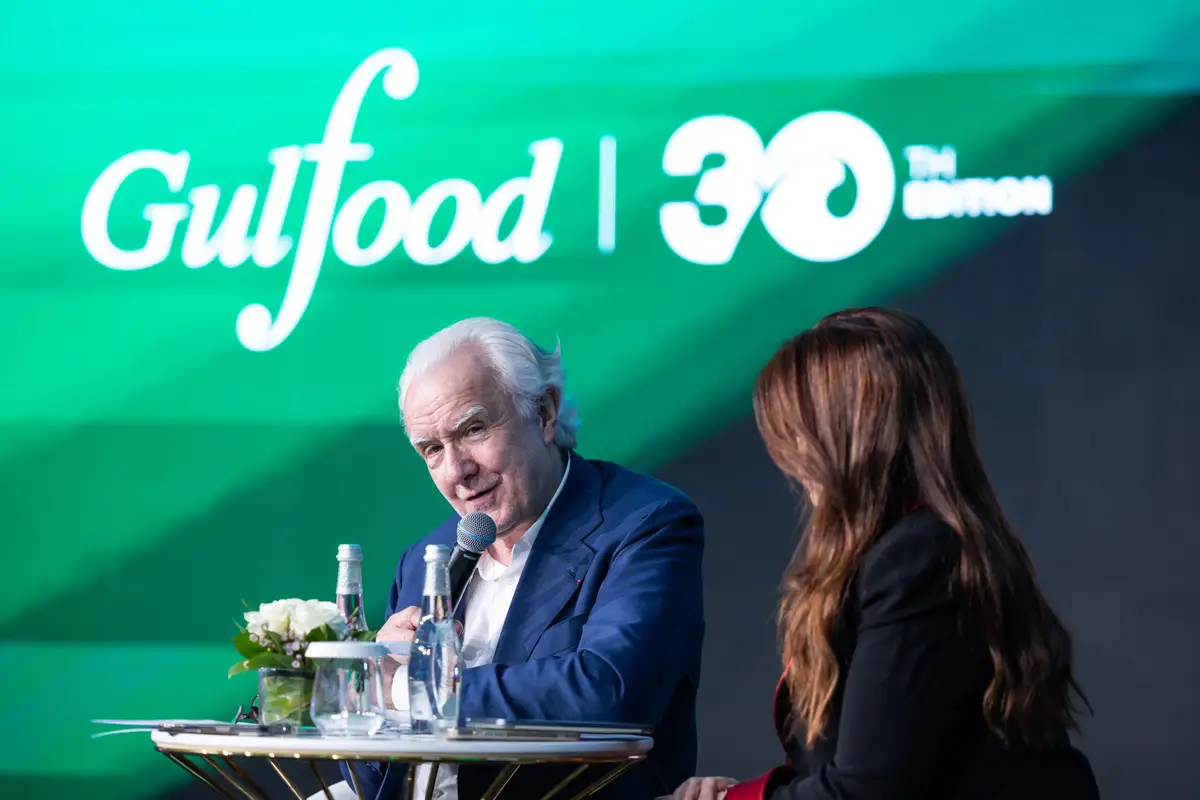Gulfood 2025 in Dubai, the largest global food business event, has brought industry leaders worldwide for trade exchanges and knowledge transfer amidst a spectacular culinary showcase.
Gulfood brings gastronomic superstar Chef Alain Ducasse and takes centre stage
Celebrity Chef and 21 Michelin Star Chef, Alain Ducasse from the acclaimed Ducasse restaurant in Paris and three Michelin Star Chef Romain Meder, Sapid (Paris), Alain’s right-hand man, showcased plant-powered perfection with a multi-approach interpretation on carrots using the entire product at Top Table.
Commenting on his philosophy of natural eating, Ducasse summarised. “We need to look at what is natural, be precocious, and use less animal protein, less fat, sugar and salt. I am not saying that I don’t use meat rather we need to use less quantity of meat but of a better quality. The fine dining industry influences the whole business, like haute couture in fashion so with our students in our schools around the world, we teach them that vegetables can be the focus and reduce the animal protein.”
Circling to the masterclass, Meder offered, “Using the whole product, we’ll use different techniques to capture the carrot’s maximum flavor and give a concentrated flavor without salt and use the capucine leaf instead of black pepper.”
Moving on, Ducasse addressed the Food500 Summit reinstating the pivotal role of culinary arts as a driver of the industry during his first appearance in the region. A chef’s roundtable exploring culinary futurism with three Michelin Star Chef, Angel Leon, and two Michelin Star Chef, Fredrik Berselius followed straight after.
F&B trading arena: Showcase continues with new product launches
A diverse range of innovative products has been unveiled at Gulfood 2025, from Estonia’s award-winning Shredded Chickenless Coconut Curry to unique creations like Spinach-Flavoured Ice Lollies by homegrown brand House of POPs, as well as bold new flavors like Date Mustard and Date Cola.
“Launching our new edible flower collection and vitality collection at Gulfood was extremely important for House of Pops. Gulfood is a global stage, and we couldn’t think of a better opportunity to showcase the best we have to offer. Winning the Innovation Award for Best Health & Wellness product is a testament to the quality and cutting-edge manufacturing we bring to the table. These pops are the first of their kind in the UAE.” Says, Mazen Kanaan, Co-founder & CEO
Food500 Summit Day 3 Agenda: Ensuring stable food trade, trends and growth opportunities, shifting geopolitics and culinary futurism
Speaking about the World Trade Organisation’s (WTO) role in ensuring stable food trade, Dr. Edwini Kessie, Director of the Agriculture and Commodities Division shared this insight. “About 80% of global trade is placed on WTO terms. Trade in food and agricultural products has increased five-fold since 2000, nearly USD 2 trillion, with many countries being able to trade their way out of poverty and enhance food security for their people such as China, Indonesia, Philippines, and Vietnam.
However, there is more to be done, and we need to make sure we level the playing field and create conditions that can harness innovation to have a system that has more high-quality food produced sustainably. Additionally, businesses have a vital role to play in working with governments to support stable trade in food and agricultural products.”
Trends and growth opportunities in the F&B space drove a panel discussion conversation around the evolving consumer mindset’s influence, GCC market dynamics, driving growth in a scale market, and the need to master innovation to meet consumer needs.
Geopolitical factors and implications on the global food supply chain were openly addressed in a panel discussion. Key areas covered include sanctions and trade barriers’ impact on the supply chain, managing supply chain risk, collaboration amongst nations to foster engagement, and the government’s role in ensuring secure and resilient food systems.
Top Table plants ahead before moving to land and sea
Chef Khaled Allibhai, Cultiva (Kenya), alongside the restaurant’s founder, Ariel Moscardi continued with the sustainable theme bringing a garden box from farm to future. Dubai-based Executive chefs from Michelin Guide listed and Gault & Millau two toques recipient Takahisa, Takashi Namekata, and Hisao Ueda, held a sushi and wagyu beef master series. Three Michelin Star Chef Angel Leon, Aponiente (Spain) emphasized the need to explore a sustainable approach when working with marine life before seeing Japanese seafood in action with Chef Pawel Kazanowski, Japanese External Trade Organisation (JETRO).
AI Developments in F&B
Over a panel discussion, the Group CEO of Papa Johns, Supreet Raju, Co-Founder of Gobbl, and Daniel Khachab, CEO – of Choco, among others, discussed developments of blockchain and AI in the F&B industry.
The study conducted in Europe in 2000 asked the 200 largest restaurant operators whether they believed they would ever need a website. At that time, only nine of them, less than 5%, thought that websites would be necessary. Today, however, it is rare for any major restaurant not to have an online presence. This shift highlights an important principle: when a new technology begins to take off, it doesn’t stop growing. This is especially true for AI, just as it was for the rise of websites.
Technologies like AI are transforming industries, and the companies that adopt these innovations early are the ones that benefit most. To keep up with the pace of change, it’s crucial for businesses to start learning and experimenting now. Those that wait to implement AI two years from now risk falling behind. Early adoption and quick learning are key to maintaining a competitive edge as technology continues to evolve, as discussed by one of the panelists.






